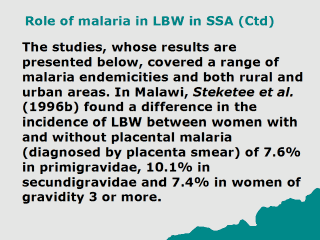Search inside of Supercourse and lectures in HTML and PPT format
 |
 |
front |1 |2 |3 |4 |5 |6 |7 |8 |9 |10 |11 |12 |13 |14 |15 |16 |17 |18 |19 |20 |21 |22 |23 |24 |25 |review |
 A prospective study of primigravidae women attending an antenatal clinic in Malawi found that among 178 singleton deliveries, 35% of infants were preterm or had IUGR (Sullivan et al. 1999). Cord blood parasitemia (odds ratio (OR) = 3.43; 95% confidence interval (CI), 1.3-8.8), placental parasitemia (OR = 2.43; 95% CI, 1.2-5.1), and postdelivery maternal peripheral parasitemia (OR = 2.78; 95% CI, 1.3-6.1) were associated with preterm delivery in this population. Parasitemia and/or clinically diagnosed malaria in the antenatal period was associated with IUGR (OR = 5.13; 95% CI, 1.4-19.4). Moormann et al. (1999) looked at the placental cytokine expression and its relationship to intrauterine growth retardation in 23 malaria-infected and 21 uninfected primigravidae women who had delivered in the same region of Malawi. The authors found a significant increase in the expression of interleukin. |